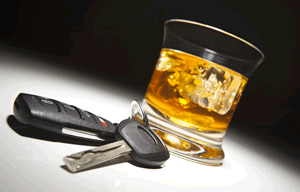Can I be arrested for DUI without taking a chemical test?
Drivers may believe they can avoid a drunk driving arrest if they simply refuse to submit to a chemical test, but it may be possible for the prosecutor to have enough evidence that you were unable to safely operate your motor vehicle and arrest you for DUI even if you do not take a chemical test of your breath, blood or urine.
So what evidence does the state need to win a DUI case against you if they do not have chemical evidence? Evidence generally includes driving actions, personal behavior and appearance, field evidence, a breathalyzer test, and incriminating statements. Listed below is more information about each category.
Driving actions - There are 20 different driving patterns which have been identified by the National Highway Traffic Safety Administration which are recognized as possible indicators of intoxication. Common actions can include straddling the white line, erratic driving, weaving and running red lights. If a police officer witnesses any of the actions listed above they may have probable cause to stop you and evaluate whether or not you are intoxicated.
Personal appearance and actions - After the DUI stop the police will look for physical evidence of intoxication. Factors they will evaluate include a driver's personal behavior and appearance. Common indications of intoxication can include blood shot eyes, slurred speech, an odor of alcohol, and the inability of the driver to follow directions. Officers are trained to notice and document any personal actions or behaviors, which are displayed by a driver during the DUI stop, which may be considered evidence of intoxication.
Field Evidence - Next, the police officer may ask you to submit to a field sobriety test. This test will provide what is called field evidence of your intoxication. The field sobriety test is generally comprised of three separate tests: the horizontal gaze nystagmus test, the one-leg-stand test, and the walk-and-turn test. These three tests are considered standardized and are used by police officers throughout the United States. There are states, however, which may use other field sobriety tests in addition to the standardized tests to identify an intoxicated driver.
Breathalyzer - Police officers may ask drivers to take a breathalyzer test. If it is a road side breath-testing device it is considered a Preliminary Alcohol Screening unit (PAS). This type of test is different than the chemical test given after the DUI arrest. The PAS is generally used to provide additional evidence of intoxication and allow the arresting officer to decide whether or not to arrest the driver for DUI.
Incriminating Evidence - Next, the prosecution will evaluate any incriminating statements you may have made during the DUI arrest and questioning. Consider also, unless you are in custody and are going to be officially interrogated, you will not have to have the Miranda Warnings read to you. Keep in mind, any statements you make spontaneously to the police officer during the DUI stop may be used against you in court.
Finally, the police officer may also ask that you submit to a chemical test. Depending on the state, you may have a choice between a blood, urine or breath test, although some states allow the arresting officer to make the choice. Refusal of this test will result in an automatic suspension of your driver's license through an Administrative License Suspension. This suspension is administered by the Department of Motor Vehicles (DMV) in your state and is enforced even if you are ultimately found NOT guilty of DUI.
What if you refuse to take the chemical test? As you can see from the information above, if the prosecution has other evidence including the breathalyzer, positive field sobriety test, incriminating statements, or evidence from your personal appearance that you were intoxicated, there is a chance they could still arrest you and convict you of drunken driving even if you refuse to take a chemical test.
Related Pages
Previous Question
Can I be a Police Officer and have a DUI?Next Question
Can I expunge my DUI arrest from my driving record?Latest Question
Will my daughter inherit my debts when I pass?
Prior to the distribution of your assets and income, the courts will pay your debts.
Category: bankruptcy


